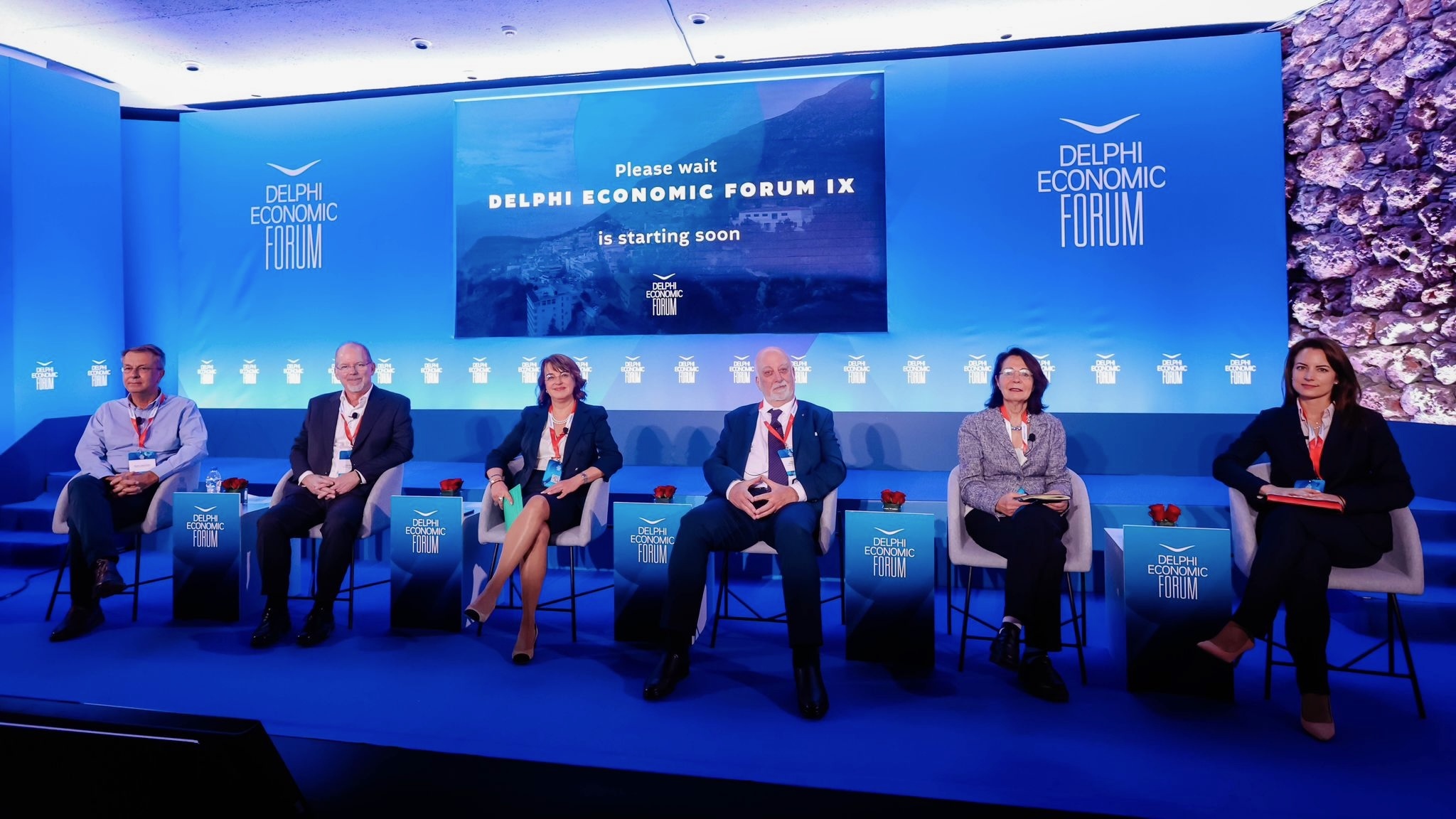Ebbesson is a Chief Scientist in NORCE and EDIH Oceanoplolis Program Director of Sustainable Ocean Harvesting. He was invited to discuss some of the main challenges facing global fisheries and aquaculture at the 9th Delphi Economic Forum in Greece, April 10-13 2024. The title of the discussion was ‘Rising Tides, Rising Threats: Safeguarding Our Oceans in a Warming World’ under the theme ‘Planet’.
On the one side, we need to safeguard our ocean and biodiversity from climate impacts, on the other side we need to obtain an increasing quantity of nutritious food from the ocean.
Today, fisheries and aquaculture is not just an important part of the blue economy, but it is a critical component of food security. Ebbesson discussed some of the main challenges facing global fisheries and aquaculture at the 9th Delphi Economic Forum in Greece this year. The Forum gathers top leaders to discuss, inspire and put words into action.
The ocean will be an important food source in the future and digitalization will be a critical tool to ensure we do it right

As the world population grows, the demand for more food – sustainable nutritious food – is well recognized. The ocean has an enormous potential to provide this emerging food gap, but only if we can remain guardians of the ocean and keep it healthy.

The Session 'Rising Tides, Rising Threats: Safeguarding Our Oceans in a Warming World' was chaired by Cheryl Nowak (on the right) and had following panelists (from the left): Kostas Lagouvardos, Lars Ebbesson, Elisabeth Lipiatou, Hercules Haralambides and Maria Damanaki.

Ebbesson at the Delphi Economic Forum in Greece, April 10-13 2024
The challenges of fisheries and aquaculture
In recent years, fisheries have stagnated due to fish stock limitations and overfishing. The warming of the ocean impact fish stocks by altering estuarian nurseries and coastal freshwater systems. In order to secure sustainable fisheries in a changing world, increased transparency and cross-sectorial data sharing will be essential to monitor the trends and changes in fish populations and be able to adapt policy and management accordingly.
While fisheries remain an important component to global food supply from the ocean, aquaculture continues to grow and surpass fisheries. In some parts of the sector, there is an emerging reduction in the growth due to regulations on environmental impacts and fish mortalities due to parasites and diseases with increasing occurrences of other threats such as Harmful Algae Blooms (HAB), string jellyfish, and emerging new diseases associated with climate change.
For aquaculture production to grow with the changing ocean and to protect the fish in production and the environment, the sector is developing a number of new productions systems and strategies that reduce environmental impacts and are more resilient to climate change and increase circularity in the production. Examples can be seen in closed- and semi-closed containment, and IMTA systems.
EDIH Oceanopolis and NORCE work to increase the uptake of digitalization in aquaculture from making the systems more efficient, improving fish welfare and optimizing energy use. The emerging technologies will contribute to coastal environmental monitoring and improving regional biodiversity.
Climate changes a threat to wild fish and shellfish
Global climate changes are bringing increased threats and changes to wild fish and shellfish populations. Therefore, there is a critical need now to obtain better data, improve data infrastructure, increase cross-sectorial data sharing and digital twins of the ocean in order to reliably understand the state and accelerated changes of life under the sea.
Only advanced analytics as AI will be able to simplify the complexity in change and integrate cross sectorial data to improve our understanding and predictions. We need to know how the increasingly high thermal oscillations, rising tides and altered ocean chemistry and currents are changing populations and food webs, migration of populations and emergence of new threats. We need this to facilitate more rapid and informed changes and adaptation of regional policy and management.

Ebbesson with Elisabeth Lipiatou, Head of Unit, Directorate General Communications Networks, Content & Technology within the European Commission. She revealed the launching of the first version of European Digital Twin of the Ocean (DTO) this June.
European Digital Twin of the Ocean will give new insight
Elisabeth Lipiatou, Head of Unit, Directorate General Communications Networks, Content & Technology within the European Commission also participated at the Delphi Economic Forum. She revealed the launching of the first version of European Digital Twin of the Ocean (DTO) this June. The DTO was announced by the Commission’s President as aiming to restore the health of the ocean and support the blue economy with a 2030 target. The DTO is linked to Destination Earth Initiative, a virtual representation of the Earth financed by the European Commission. This is good news since there is a need for a digital transition that combines the digital transformation and the green transition.
Digital actions, such as the European Digital Twin of the Ocean (European DTO) and European Digital Innovation Hub (EDIH) Oceanoplolis, are important vectors to mitigate and adapt to climate change and to sustainably increase food from the ocean and accelerate the green transition.
Some specific digital technologies have the capacity of employing AI to increase quantity and quality of data accuracy on fish and shellfish harvests, accounting for geographical, water characterization and depths associated with catch and bycatch. Increased deployment of smart fishing technologies will reduce bycatch but also be able to adapt to changing quotas and management directives. Sharing these data directly into for instance the European Digital Twin of the Ocean (DTO) will provide important insights into the populations dynamics risks and opportunities.
The ocean will be an important food source in the future and digitalization will be a critical tool to ensure we do it right.